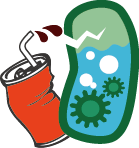Team:UT-Tokyo
From 2012.igem.org
(Difference between revisions)
Tanakatomo (Talk | contribs) |
|||
| (One intermediate revision not shown) | |||
| Line 12: | Line 12: | ||
| - | ''E. coli'' cells have intrinsic metabolic systems related to '''synthesis of hydrogen from glucose via formic acid'''. We are trying to improve the latter part of this metabolic system, the formic acid-hydrogen pathway in two ways. One is by overexpressing a transcriptional gene which enhances/ a step in this pathway, and the other is by repressing the inhibitive gene of the hydrogen production | + | ''E. coli'' cells have intrinsic metabolic systems related to '''synthesis of hydrogen from glucose via formic acid'''. We are trying to improve the latter part of this metabolic system, the formic acid-hydrogen pathway in two ways. One is by overexpressing a transcriptional gene which enhances/ a step in this pathway, and the other is by repressing the inhibitive gene of the hydrogen production. If we are successful, what we have to do for getting energy is to share our sweets and juices with ''E. coli''. |
| Line 36: | Line 36: | ||
:H<sub>2</sub> Production | :H<sub>2</sub> Production | ||
;[[Team:UT-Tokyo/Project/Inhibition|Project2: Inhibition without Knockout]] | ;[[Team:UT-Tokyo/Project/Inhibition|Project2: Inhibition without Knockout]] | ||
| - | : | + | :Inhibit Transcription Factors without Knockout |
;[[Team:UT-Tokyo/Parts|Parts]] | ;[[Team:UT-Tokyo/Parts|Parts]] | ||
:The BioBrick parts we made | :The BioBrick parts we made | ||
Latest revision as of 04:02, 27 September 2012
Home

iGEM UT-Tokyo aim to improve Escherichia coli's intrinsic hydrogen synthesis pathway by transgenics and to make E.coli produces hydrogen more efficiently with a view of using it as an energy source.
Sweetaholic Energy Generator:
Hydrogen Production from Sugar-rich Waste by E.coli
Today, large quantities of food and drinks, together with the enormous amounts of energy they contain, are dumped without being reused. However, the moisture in this waste prevents it from being used as a energy source by burning. Our project aims to reuse such nutritious garbage by Escherichia coli digesting glucose to synthesize hydrogen, which is expected to be used in various useful ways, such as in fuel cells.
E. coli cells have intrinsic metabolic systems related to synthesis of hydrogen from glucose via formic acid. We are trying to improve the latter part of this metabolic system, the formic acid-hydrogen pathway in two ways. One is by overexpressing a transcriptional gene which enhances/ a step in this pathway, and the other is by repressing the inhibitive gene of the hydrogen production. If we are successful, what we have to do for getting energy is to share our sweets and juices with E. coli.
- by overexpressing a transcriptional gene... in detail: Project H2 E.coli
- by repressing the inhibitive gene... in detail:Project2: Inhibition without Knockout
 "
"


